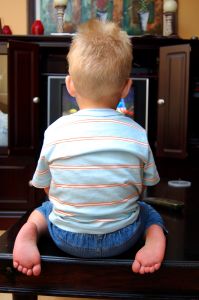 The simplicity of the experiment at the day-care center and the starkness of the results stunned the parents. When a class of two- to five-year-olds watched public television’s big-hearted purple dinosaur, “Barney,” they sang along, marched along, held one another’s hands, and laughed together. The next day, the same class watched the aggressive teenage avengers, “Power Rangers.” Within minutes, they were karate-chopping and high-kicking the air—and one another. “Even though the goal of these programs isn’t to teach, our kids are learning because they’re always learning,” says David Walsh of the National Institute on Media and the Family, who conducted the experiment. According to the National Television Violence Study, prime-time violence, on both broadcast and cable networks, has increased since 1994. The study also concluded that the way violence is portrayed in most instances—glamorized, sanitized, and without negative consequences—poses a serious risk to children. “These patterns teach children that violence is desirable, necessary, and painless,” says Dale Kunkel of the University of California at Santa Barbara, where the study was done. ***** Children imitate what they see and hear, and they seem to have a penchant for copying the negative. Young children, especially, can't always tell the difference between good or bad, and it's even harder when those guilty of some of the worst behavior are made to look so enviable, so "good," in other ways—good looking, affluent, popular, smarter than the adults, and free to do as they please. Children are in the process of forming the values that they will carry with them through life, and it's their parents' responsibility to guide that process. Parents are failing at that job if they let their children watch what they want without any parental guidance or explanation as to what is acceptable civil behavior and what isn't. And that goes for shows that are supposedly geared to children, even the ones that are meant to be educational. Just because a movie or TV show is rated for children doesn't necessarily mean that it's good for your children. Parents need to take personal responsibility for that decision. They also have a responsibility to steer their children away from the negative, either by not exposing their children to it in the first place, or by explaining why it's bad and not to be imitated. If you're a parent, you need to take a long, hard look at what's out there and decide if that's how you want your children to turn out, because what they watch and listen to and imitate today, they will become tomorrow. - D.B. Berg
0 Comments
Leave a Reply. |
Categories
All
Archives
March 2024
LinksFree Children's Stories |

 RSS Feed
RSS Feed
